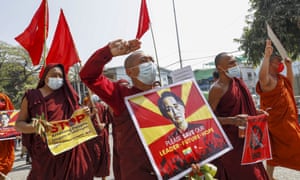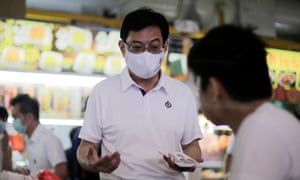
Aung San Suu Kyi charged for breaking Covid restrictions, her lawyer says
Updated
at 6.58am EST
Public health experts in New York City are warning locals not to rush back into restaurants, which have reopened at 25% capacity following months of restrictions, Miranda Bryant reports.
Although eating out is a pastime for which the city is famous, New Yorkers were mostly tentative about returning to their favourite spots over the Valentine’s Day reopening. Restauranteurs said that diners were apprehensive about sitting inside, preferring to opt for more Covid-secure outdoor heated areas.
Last spring, New York City was at the global centre of the pandemic that has killed 28,341 in the city as of Monday, according to official figures.
Updated
at 6.08am EST
Palestinians have accused Israel of blocking a vital first shipment of 2,0000 Covid-19 vaccines intended for frontline health workers from entering Gaza, Oliver Holmes reports.
The Palestinian Authority said a planned transfer of Russian Sputnik V vaccine doses to the coastal enclave, which is geographically disconnected from the West Bank where the authority is headquartered, was blocked on Monday at an Israeli checkpoint.
“[T]he occupation authorities prevented their entry,” the authority’s health minister, Mai al-Kaila, said in a statement. “These doses were intended for medical staff working in intensive care rooms designated for Covid-19 patients, and for staff working in emergency departments.”
An Israeli security source told the Guardian the authority had previously made a request to the national security council, a body that belongs to the Israeli prime minister’s office, to send vaccines to Gaza, but that it had not made a decision.
The Greek prime minister Kyriakos Mitsotakis is meeting in emergency session with civil protection officials as media outlets report that the heavy snowstorm sweeping the county, which has halted its vaccination drive, has now resulted in the death of a man on Crete.
With widespread power cuts in Athens the leader called the meeting to coordinate efforts to deal with snowfall described as unprecedented. People have been “strongly advised” to avoid leaving their homes with all Covid-19 vaccination centres closed until the bad weather passes. Two mega facilities capable of vaccinating 20,000 people a day were opened in the capital and the northern city of Thessaloniki only on Monday.
The 56 –year- old man was found dead outside an animal pen, on the southern island of Crete after suffering what is believed to have been a heart attack.
Calls have mounted this morning for refugees living in tents in Elaionas, a camp in central Athens, to be relocated because of the snowfall forecast to last through Wednesday.
On Monday, the migration minister Notis Mitarachis said the estimated 100,000 refugees in Greece would receive the Covid-19 jab when it is rolled out. To date, the centre-right government has focused inoculating those in care homes, the elderly and people with underlying health conditions.

Updated
at 5.22am EST
A Catholic priest in Ireland is providing takeaway ashes in plastic sauce containers so parishioners can honour Ash Wednesday despite coronavirus restrictions.
A Centra shop in Clonmany, county Donegal, has helped Fr Brian Brady to pack and distribute ashes in 200 containers usually used for dips and sauces.
Parishioners have snapped up the containers so they can administer their own ashes by placing them in the form of a cross on their foreheads tomorrow. The ritual signifies repentance and marks the first day of Lent, a six-week period of penitence before Easter.
“A lot of our parishioners would come every year for their ashes and it’s so important that we honour those traditions – even at these most difficult times,” Fr Brady told the BBC. “We really did have to stretch the old imagination on this one though.”
The ashes are from burnt palms. Containers also include a prayer and are limited to one per household.
Updated
at 5.16am EST
More than a quarter of Australians ‘unsure’ about getting a Covid-19 vaccine – survey
Just 64% of Australians will “definitely” get a Covid-19 vaccine while more than one quarter (27%) are unsure, according to government research.
Some 9% of Australians aged over 16 said they will “definitely not” get the vaccine, according to the poll of 4,001 people commissioned by the health department.
The research was released by the government on Tuesday after the arrival of Pfizer vaccines and approval of AstraZeneca for a rollout to begin on Monday.
The government is confident that achieving full approval from the Therapeutic Goods Administration for both vaccines will help support the rollout, and public confidence will improve as vaccines are administered.
But other data sources point to an uptick in vaccine hesitancy. Between August and January the Guardian Essential poll found the proportion of people who said they would “never” be vaccinated rose from 8% to 11%.
In September, the Australian National University found that 5.5% of Australians would definitely not get the vaccine and a further 7.2% would “probably not” – results that are expected to deteriorate when it releases the next phase of its longitudinal research later this week.
According to the health department research, 48% of Australians would choose to get the vaccine as soon as it is available. A total of 71% would choose to do so by October.
The top three motivators for taking the vaccine were to protect oneself from catching Covid, to keep Australia safe from Covid, and to protect the elderly and most vulnerable.
The top three barriers were that long-term side effects are still unknown, that “vaccines have been developed too quickly” and concerns about having an allergic reaction.
Read more of Paul Karp’s report here: Two-thirds of Australians ‘definitely’ want Covid vaccine, while 27% are unsure










